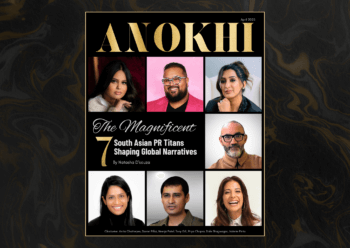
San Francisco media company Women 2.0, founded by Shaherose Charania, levels the playing field for female entrepreneurs in the tech sector.
Eight years ago, Shaherose Charania, fresh off graduating from the University of Western Ontario’s vaunted Ivey School of Business, moved to Silicon Valley looking to make a splash in the world’s tech mecca. When she arrived, however, she noticed something a bit disturbing.
“I was going to different networking events, and looked around the room and often was the only woman in the room,” she recalls. “It was clear to me that I was in a city where things were all about innovation and changing the world and changing people’s lives, and the people that were doing it didn’t look at all like me . . . The people that were starting these companies, they were basically friends funding friends. While that’s a good strategy, it’s a fairly perpetual cycle of dudes funding dudes.” Charania, along with a few friends, decided to do something about it.
“We thought — [me and the other] co-founders at the time — ‘We’re just going to do some casual networking events and try to build an integrated network where people can get to know each other, they can support each other.’”

Women 2.0 was born. It began as an evenings and weekends gig, hosting strangers in their living rooms in their spare time, putting female innovators in the same room with female investors and fostering business relationships that would balance the gender ratio in the city’s tech sector. Five years later, she quit her day job and dedicated her full attention to growing the company.
“What I realized was there was a need for this all over the world,” Charania says, “because more and more cities were realizing they needed to build tech hubs, and our movement was sort of taking off.”
Today, Charania and her team — consisting primarily of vice president Sepideh Nasiri, events coordinator Lauren Kim and content editor Jessica Stillman — curate events across North America.
Their Founder Fridays are held monthly in 20 different cities and feature a brief address from a female figure in the tech world followed by an evening of networking, giving interested parties ongoing access to potential partners, employees, investors and even consumers.
Twice a year, they hold a larger-scale conference, featuring a keynote address, an industry panel, networking and a startup competition that gives budding entrepreneurs a chance to hone their pitching skills on the Women 2.0 stage.
Between in-person events, they also host a slew of more intimate, Google Hangouts-powered online meetings called Investor Hangouts and Founder Hangouts.
“There are a number of stories where it goes from the person having their first exposure to the tech community through us and then suddenly, quickly getting integrated and absorbed in some way, in a great way,” Charania says. “We had a company that was on our stage in New York that got acquired by Yahoo like three or four months later. We had a company that came in to pitch all the way from Vietnam and a month after ended up returning because they got accepted into an incubator called 500 Startups.” Among their most valuable tools is www.Women2.com. Here, would-be tech entrepreneurs will find information on upcoming events and personal stories and instructional content written by and for women in the tech sector.
“Ninety per cent of our users are women,” Charania explains. “So [the site] has a very Pinterest-y feel to it; women like to interact with images. And more importantly . . . the content [is] very storydriven. We realized that women like to learn more through firstperson stories than straight factual [news]. And that’s been going along really well as a way to inspire and educate women in a way that feels comfortable to them.”

Ultimately, though, the value of the website — and all the conferences and events curated by Women 2.0 — extends beyond the opportunity to connect and learn tricks of the trade.
“Without seeing someone that looks like them, women have often felt like they can’t do it,” Charania says. “And by changing that, and saying ‘Look there’s a woman who has,’ that’s exactly what has been working.”
For Women 2.0, the future is expansion, as the CEO and her partners want to continue doing exactly what they have been doing, only on a larger scale. “We’ve got our offerings set and we know that they work, and now it’s time to go beyond that and get more people involved,” she says. So don’t be surprised if someday in the near future, you come across a Founder Friday in your hometown.
Until then, however, we’ve got you covered. Given that Charania is, herself, the president and CEO of a very successful startup, we couldn’t let her go without picking her brain on behalf of all entrepreneurial ANOKHI readers.
“It’s all about having a good story that’s compelling and not bogging down the story with details,” she says when asked about the key to a successful pitch. “Knowing what your pitch is, knowing how you’re going to engage people, is really important. And being short and succinct is really important. “Context is really important,” she continues. “You can use buzz words to shorten your pitch if you know they are in the industry, but if they’re not you’re going to have to find a [different] way . . . [and] if you’re looking to get someone to invest in you, then make sure you share numbers.”
More important than your business plan, however, are the men and women you choose to work alongside you. “People don’t really realize until they’re in it that the people is what makes the company and not the billion-dollar idea . . . The first piece is ensuring that your founding team is built around honesty and trust, [and] that it’s built around a set of people that have complimentary skills rather than conflicting (meaning the same) skills,” she says. “It’s really important that if there’s two, three or four of you that you all bring something you need to the table. Often when you have two people of similar skillsets, it leads to power struggles, it leads to confusion of role.”
Moreover, she explains, it’s imperative that your team shares “a common vision of the impact you want to have on the world” and that everyone is on the same page in terms of the timeframe for achieving that goal.
“It’s like finding a husband . . . you’ve got to founder-date a lot,” Charania explains. “I always encourage people to do short projects with people before they commit to working with them . . . By doing that, you really experience what it’s like to work with someone and whether you want to continue to see that person.”
But Charania’s best piece of advice doesn’t have anything to do with tips for wooing investors or team-building or website design. Rather, she says, most of us just need to get out of our own way.
“When you’re afraid to fail, you don’t even try. That’s worse than anything else. And I think that there are people who make good entrepreneurs — men and women — because they’re not afraid of failure . . . I’m telling you, there’s more of that in the journey than there is success.”
Matthew Currie
Author
A long-standing entertainment journalist, Currie is a graduate of the Professional Writing program at Toronto’s York University. He has spent the past number of years working as a freelancer for ANOKHI and for diverse publications such as Sharp, TV Week, CAA’s Westworld and BC Business. Currie ...














































































































